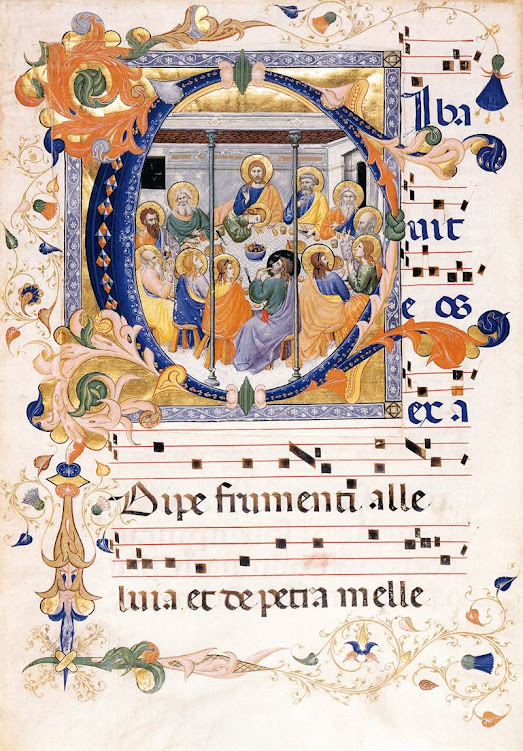Ansin. an deisceabal eile, a tháinig ar dtús
chun an tuama, chuaigh sé isteach agus chonaic agus chreid sé (Eoin 20:8; Soiscéal an Domhnaigh).
The Easter Vigil in the Holy Night
Readings (Jerusalem Bible: Australia, Ireland, New Zealand, Pakistan)
Readings (English Standard Version, Catholic Edition: England & Wales, India, Scotland)
Readings (New American Bible: Philippines, USA)
Readings (Jerusalem Bible: Australia, Ireland, New Zealand, Pakistan,)
Readings (English Standard Version, Catholic Edition: England & Wales, India, Scotland)
Readings (New American Bible: Philippines, USA)
Gospel John 20:1-9 (English Standard Version, Anglicised)
On the first day of the week
Mary Magdalene came to the tomb early, while it was still dark, and saw that
the stone had been taken away from the tomb. So she ran and went to Simon Peter
and the other disciple, the one whom Jesus loved, and said to them, ‘They have
taken the Lord out of the tomb, and we do not know where they have laid him.’
So Peter went out with the other disciple, and they were going towards the
tomb. Both of them were running together, but the other disciple outran Peter
and reached the tomb first. And stooping to look in, he saw the linen cloths
lying there, but he did not go in. Then Simon Peter came, following him, and
went into the tomb. He saw the linen cloths lying there, and the face cloth,
which had been on the head of Jesus, not lying with the linen cloths but folded
up in a place by itself. Then the other disciple, who had reached the tomb
first, also went in, and he saw and believed; for as yet they did not
understand the Scripture, that he must rise from the dead.
Léachtaí i nGaeilge
Deacon proclaiming the Exsultet at the Paschal Candle
Fr Pádraig Ó Croiligh is a priest of the Diocese of Derry. Some years ago he published a book of religious poetry in Irish with the title Brúitíní Creidimh, which could be translated as 'Mashed Potatoes of Faith'. In his short poems he helps the reader digest aspects of our faith and religious practices.
His poem Fód na Cásca (The Sod of Easter) refers to what seems to have been a custom in parts of rural Ireland where the hearth (fireplace) was the heart of the home, with a fire made from turf (peat) 24/7 as we say now, for cooking and for heating the house. The family and visitors gathered around it for the family rosary, for telling stories and singing. In many parts of Ireland people would cut their own turf in local bogland during the summer.
The poem for me is a reflection of these lines in the Exsultet: glowing fire ignites for God's honour, a fire with many flames divided, yet never dimmed by sharing of its light. One of the most beautiful moments in the Easter Vigil is when the light of the Paschal Candle is shared, those who have lighted their candles from it passing on the light to others until the whole church is ablaze with the light of Easter. Not only is the light never dimmed but it is multiplied by sharing.
The newly-lighted 'fire in the hearth' on Holy Saturday is to be shared with those who live in the house and with those who visit, giving heat and light and nourishment through the food cooked and baked over it. And it recognises our need for constant renewal and forgiveness in the last line: go cionn bliana eile ar a laghad (at least for another year).
Fód na Cásca / The Easter Sod
Le / by Pádraig Ó Croiligh
Ghlanaidís an simléir fadó / Aoine an Chéasta, / Agus
d’fhágaidís gan tine é / Go dtí an lá dár gcionn / Go bhfuair siad aibhleog
bheannaithe /
Ó thine na Cásca / Ar an Sathairn Naofa.
Aiséírí an Tiarna a thugann lasadh don tine teallaigh / go cionn bliana eile ar a laghad.
They would clean the chimney long ago /
On Good Friday,
/ And
would leave it without a fire / Till the following day / When they would be able to
light a sod / Blessed by the Easter fire / On
Holy Saturday.
The Resurrection of the Lord / Is what lights the
fire in the hearth / At least for another year.
Traditional Latin Mass
Easter Sunday
The Complete Mass in Latin and English is here. (Adjust the date at the top of that page to 04-20-2025 if necessary).
Epistle: 1 Corinthians 5:7-8. Gospel: Mark 16:1-7.












,%20WGA.jpg)

